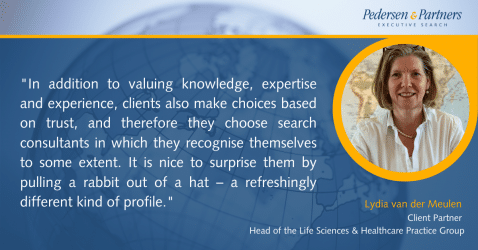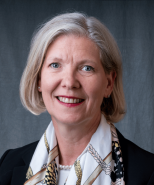Committed to Female Executive Talent: a Topvrouwen Q&A with Lydia van der Meulen of Pedersen & Partners
As part of a push towards even more gender equality in The Netherlands, an increasing number of executive search firms are signing the Executive Search Code, under which they voluntarily commit to taking an active role in the appointment of women to top positions. SER Topvrouwen gives these companies a platform, and directly asks them: how do they contribute to a better male/female balance at the apex of the business world, how do they deal with quandaries, and what successes have they achieved? Today we speak to Lydia van der Meulen, Client Partner and Global Head of the Life Sciences & Healthcare Practice Group at Pedersen & Partners.
1. Why did your firm think it was important to sign the Executive Search Code? As an extension of this, how do you contribute to boardroom success?
As an international executive search firm, Pedersen & Partners has diversity in its DNA, which is why our team in Amsterdam found it important to sign the Executive Search Code. The Amsterdam team is 50:50 men and women; of our consultants, half are Dutch and half are of different nationalities.
As the daughter of a working mother, and the mother of a TU student, I have found it important throughout my career to support other women, both in my professional capacity and through various initiatives (ECWO seminars, Sisterhood in Business, etc.). To me it is a no-brainer that we should promote as many female candidates as possible in each of our search assignments. Recent successful female placements include: Non-Executive Second Tier Board member, Corporate Product Development, European Public Policy, Global Quality, Managing Director, Regional Commercial Operations, Human Resources, Business Development, and in Business Development for Private Equity. I am proud that many of these placements have been made internationally.
2. How do you distinguish yourself from other companies?
Pedersen & Partners is distinctive in many ways. Our firm is a fully integrated organisation in terms of processes, people, and services. We work as one international team, and we have a single global profit centre. Our head office is in Amsterdam, but our senior leadership team and our partners work together virtually all over the world.
Pedersen & Partners was founded in 2000 as an executive search firm to serve Western multinationals in emerging markets, and since then we have grown into an organisation with 54 wholly owned offices in 50 countries, 350+ consultants and support staff. With 56 different nationalities and 70 different languages, we are a truly diverse organisation.
With such an international organisation and without local P&Ls, we are equally integrated as a team here in the Netherlands. Depending on the vacancy, we can carry out cross-border search assignments from multiple countries, cooperating remotely and seamlessly. So, I can work locally in the Netherlands on executing a search, and just as easily deliver on projects with local colleagues in India, Poland, Brazil or Germany. All this provides a great deal of energy and inspiration.
3. Since signing the code, have you been (even) more careful when compiling longlists and shortlists? Has anything changed within your firm since you made this commitment?
Yes. We have always valued diversity, or rather neutrality: whether the candidate selection process is neutral with respect to gender, nationality, age or any other aspects, it is nevertheless made in accordance with the requirements of the role and the company’s culture. However, as a team, we have become even more aware of these things. We also notice that as an international search firm, we are recognised in the market for our specific international reach and cultural diversity, and this further enhances our diversity.
4. Susan Vinnicombe, Professor of Women and Leadership at Cranfield University, told the Financial Times that the “big boys” in the international search world have been “shaken up”. Do you subscribe to this international trend, and are Dutch headhunters moving sufficiently with the times?
Dutch headhunters move with the times, but there is a backlog in the market when it comes to mature female talent. In comparison, the UK, Scandinavia, Belgium and countries in Central and Eastern Europe are more emancipated. During my years in the UK, people looked strangely at senior professionals who worked partly part-time, both women and men.
5. Of course, you must work with the wishes of your clients. Not everyone is open to more women on the board, some directors and supervisors will prefer a safe name that does not alarm shareholders, or someone with a “classic” track record from their own network. Do you have to deal with “old-school” clients who like to opt for what is jokingly called male, stale and pale, and does this cause friction?
I think that in addition to valuing knowledge, expertise and experience, clients also make choices based on trust, and therefore they choose search consultants in which they recognise themselves to some extent. As a search firm, Pedersen & Partners is precisely that alternative.
6. What is the wisest choice, in the event of friction? Do you have to pound on the table now and then?
The client is king, but with the right client management and good stakeholder management, it is nice to surprise clients by pulling a rabbit out of a hat – a refreshingly different kind of profile. Alternatively, you can ask about their own children, the talent of the future. This also encourages different perspectives.
7. Do you consciously engage with women from your network in order to invest in their chances of a top position? How do you support women in realising their full potential?
Yes, my colleagues and I do this together. We hold meetings, and we invite our contacts at SER Topvrouwen and other D&I initiatives to our own events such as HR Round Table, Cultural Diversity breakfasts and Private Equity breakfasts. Of course, all these events went online during the pandemic, but we hope to resume them later this year. In addition, I have created an international D&I LinkedIn Group, which is supported by Pedersen & Partners.
8. Your firm participates in SER Topvrouwen’s (online) speed dates. What is your overall impression of the candidates? Can they improve their performance? Are they sufficiently aware of the possibilities and challenges?
All candidates are unique of course, and they are at different stages of exploring their capabilities: pure networking and horizon-broadening, a targeted search for the next career step, or a first or additional non-executive role.
9. How do you view quotas or other mandatory measures to diversify boards?
I have two thoughts on this: imposed quotas or mandatory measures on the final composition of boards can lead to a compromise, or quite often, a woman who is just there to make up the numbers – and that can backfire in some cases. I find “leading by example” far more inspiring; I am fully in favour of pursuing mixed longlists. However, at the end of the day, we are in the business of finding the best candidate, we cannot make them; it’s about the most suitable person. And it is always valuable to look for international talents beyond the local market.


